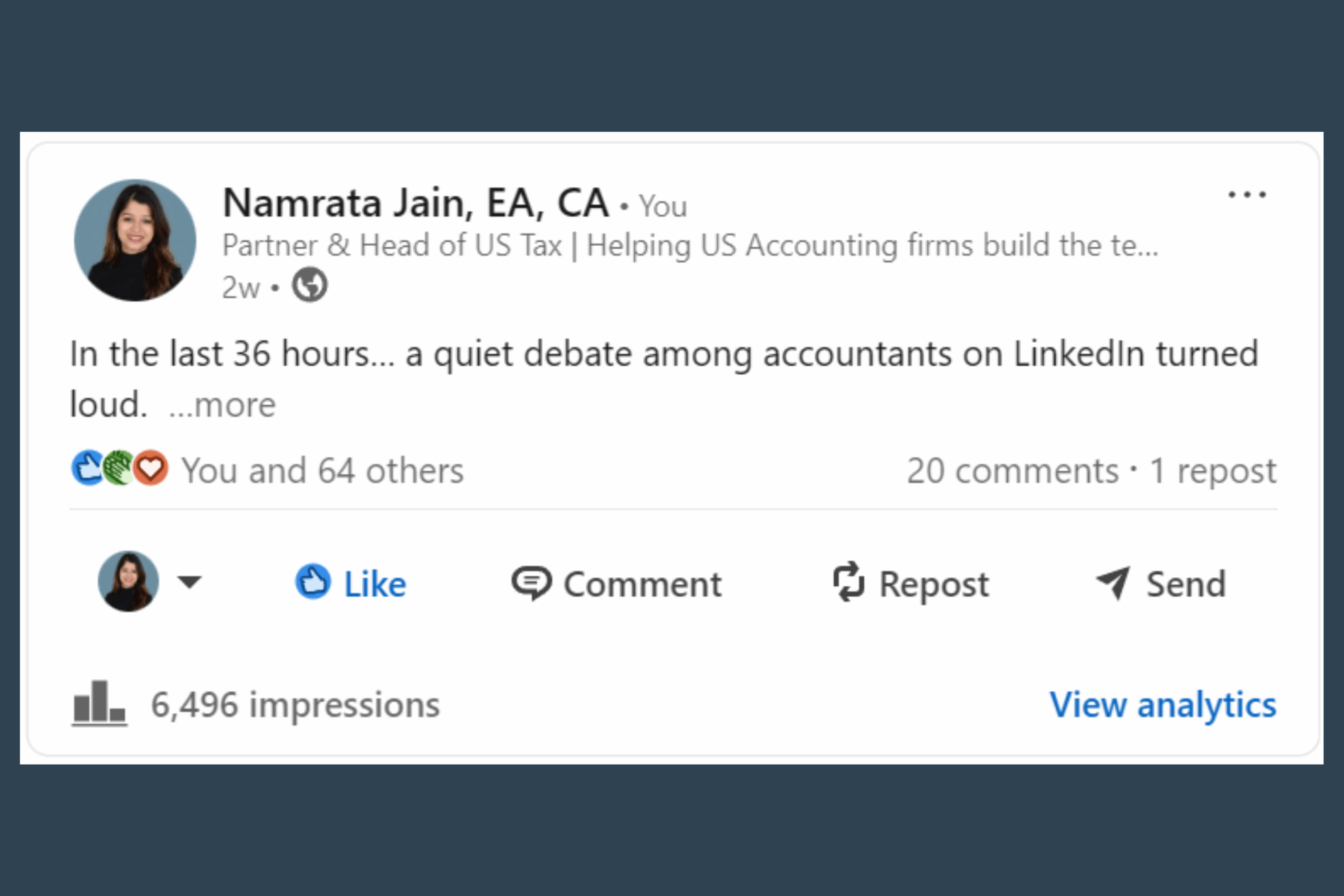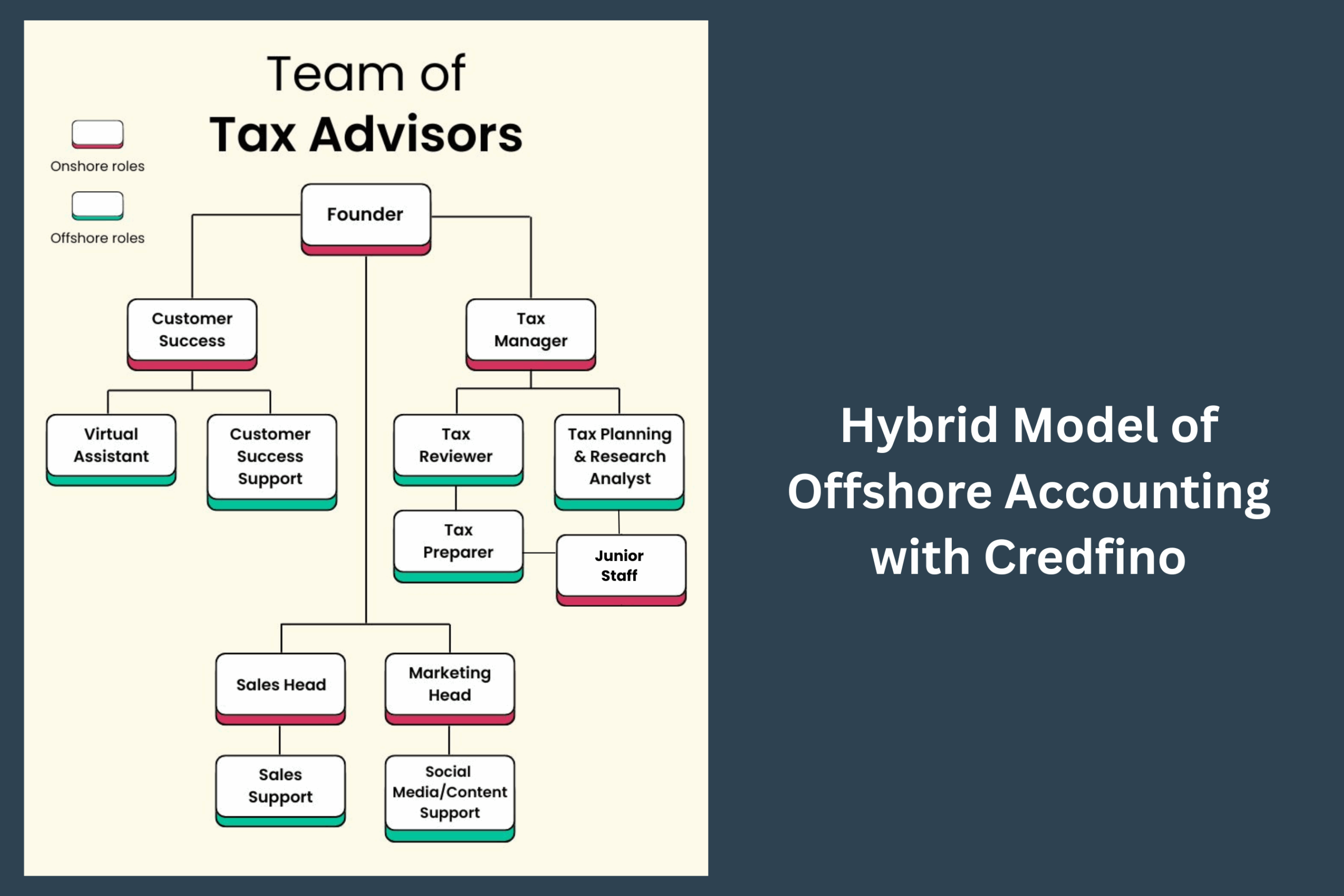
Why Tiered Pricing Strategy is a must for Accounting Firms (+Template Inside)
Tiered pricing gives accounting firms a flexible, confident way to price their services and raise fees without fear. Template included.

In late May 2025, I sparked a conversation on LinkedIn that hit a nerve with accounting professionals. After seeing the ongoing debate on whether to offshore accounting or not, I decided to share my take on it. You can check the same here.
The response was immediate and intense. Fellow firm owners didn’t hold back, and the engagement numbers told the story. This blog is going to provide an in-depth analysis of the same.
Offshore accounting is here to stay. The question is how it is affecting the accounting industry.

No one can argue against the obvious advantages of offshore accounting teams. The cost savings alone are enough to make any firm owner take notice. Then there’s the scalability factor. You can grow your team without the headaches of the ongoing talent shortage. And let’s not forget access to a global talent pool that often brings impressive technical skills to the table. That’s what the data collected by IPA Data Dive also reflects.

Offshored accounting services began as a solution to one clear problem: the ongoing talent shortage. But now, they’re driving a structural shift in how firms operate, grow, and serve clients.
Despite the benefits, many firm owners are worried about the micro and macro effects. The question isn’t whether offshore accounting can help your bottom line this year. The question is: what happens to accounting as a profession when we make these choices?
Many leaders are asking the right questions:
These concerns matter. But none of them are unsolvable.
Related Read – 4 Staffing Models That Accountants are Using for Offshore Accounting
Clients don’t react to offshoring accounting services. Rather, they react to why you’re doing it. If it looks like a cost-cutting move, they’ll assume service will suffer. But if it’s positioned as a step toward better responsiveness and quality, they’ll understand and even support it.
Here’s what you could tell them:
Dear Client,
We’ve been growing, and with that growth comes new challenges. The biggest one? Capacity.
As the demand for skilled professionals outpaces supply, our ability to turn work around quickly, without sacrificing accuracy, has been tested.
To stay ahead, we’re expanding our team beyond borders. It will allow us to keep your work moving, keep our standards high, and spend more time advising you. We are aware of the challenges that come with offshore accounting, data security being one of them. To ensure that your data stays protected, we have picked our offshore staffing partner after thorough due diligence.
You can count on us on this one!
We’re still your team. Just now, with more hands to help.
Many experienced firm owners are asking: What about our juniors? How will they learn? Grow? Build judgment?
Honestly? I love hearing these questions. It shows we’re not just chasing efficiency. We’re still thinking about the future of the profession.
The answer isn’t to choose between offshore or onshore. It’s to design a hybrid structure that works. Offshoring shouldn’t mean offloading everything. Use it to clear space, so your junior staff can move beyond data entry and start thinking critically earlier in their careers.
Create team layers where juniors assist, review, and gradually lead, not just keep on preparing 1040s for 2 years straight.

Our offshore tax team is built to function as a seamless extension of your firm — not just fill seats. Each account is supported by a core five-member team: a Tax Preparer to handle clean, accurate prep work; a Tax Reviewer to ensure quality control; a Tax Planning & Research Analyst to support more complex client scenarios; a Virtual Assistant to manage admin, e-filing, and trackers; and a Client Success Support role to ensure nothing slips through the cracks. For high-volume firms, we scale by adding more Preparers and Reviewers, with junior reviewers positioned for growth and training. Oversight is led by an experienced onshore Tax Manager and Client Success Lead who keep deliverables, deadlines, and client communication on track
Ironically, offshoring done right can accelerate a junior’s path. Less grunt work. More exposure. Real growth. And that’s how we protect the pipeline.
Whether you’re offshoring or staying fully onshore, one thing remains non-negotiable: your firm’s data security. With cloud-based accounting systems, client data is more accessible. Not just to your team, but potentially to hackers, too. That’s why a strong security infrastructure isn’t optional.
At Credfino, we take that responsibility seriously. As your offshore staffing partner, we use Virtual Desktop Infrastructure (VDI) and Remote Desktop Protocol (RDP) to create a secure, virtual work environment. Offshore team members access systems as if they were sitting in your U.S. office. But without moving a single file outside your network.
This setup protects you in five key ways:
According to the AICPA’s 2023 National MAP Survey, nearly 30% of firms reported outsourcing domestically, while 25% have already tapped into offshore talent. Another 14% plan to start outsourcing within the U.S., and 12% intend to begin offshoring. The trend is clear: firms are actively rethinking how and where they build capacity.
With the ongoing CPA talent shortage and rising demand for accounting services in the U.S., firms are being pushed to look beyond traditional hiring models. Accessing a global talent pool and building teams across time zones is becoming the norm.
The 2024 Rosenberg MAP Survey reinforces this shift. More than half of firms with over $10 million in revenue now have offshore staff, and that number is expected to grow. Offshoring is a wayout for firms looking to scale without compromising quality.
Offshoring accounting is doing more than just plugging a talent gap. It’s quietly shifting the entire structure of how firms grow and deliver services.
For years, the accounting profession has carried a reputation for being boring and low-paying. But that’s changing. NPAG took initiatives, motivating accounting professionals to pledge and show the cool side of accounting. One university even came up with an offer of up to $10,000 (yes, $6,659 in freedom bucks) to students who can make a compelling case for accounting as a career, through a TikTok or Instagram Reel.
If we zoom out and get back to basics, what’s exciting about accounting isn’t the compliance work. It’s the advisory. Tax prep, bookkeeping, audits… while they’re necessary, but often repetitive and transactional. And that can be offshored to India.
Advisory is where things get interesting.
It’s where accountants:
• Solve complex problems
• Guide strategic decisions
• Handle M&A, valuations, forecasting
• Lead transitions and implement better systems
And the cherry on the cake is that this is also where the highest fees and best margins are.
With offshoring in place, firm owners are finally freeing up onshore teams to focus on this kind of work. And that’s where the real shift is happening.
Ability to grow is held back by the ability to find quality people. With offshore accounting in the picture, that’s not the case anymore.
Offshore accounting is changing more than just cost structures. It’s changing how firms operate, grow, and serve. With the right systems and intent, it opens up capacity, strengthens client delivery, and gives onshore teams room to do more meaningful work. But success depends on how thoughtfully it’s implemented. Firms that lead with transparency, build hybrid teams, and prioritize both data security and team development are the ones shaping the next generation of accounting.
At Credfino, we’ve helped over 80 CPAs and accounting firms make the transition from onshore only to hybrid and take advantages of offshore accounting. If you’re ready to explore how offshoring can support your firm’s growth, schedule a call with us today. Let’s take the first step together.
Accounting firms, whether outsourcing or not, must prioritize data security. Online operations expose sensitive financial data to potential threats. Implementing robust security measures, like VDI and RDP, is crucial to protect client information. These technologies create a secure virtual environment, preventing unauthorized access and data breaches.
By safeguarding sensitive data, accounting firms can maintain client trust and comply with stringent data privacy regulations.
Establish Clear Channels: Use a combination of tools like email, instant messaging, video conferencing, and project management software for seamless interaction.
Regular Communication: Schedule regular meetings or check-ins to discuss project progress, challenges, and expectations.
Overcome Language Barriers: Utilize clear and concise language, avoid jargon, and consider language training for team members.
Cultural Sensitivity: Understand and respect cultural differences to build rapport and trust.
Documentation: Maintain clear and detailed documentation of processes, decisions, and agreements.
Feedback Mechanisms: Encourage open feedback and provide constructive criticism.
Build Relationships: Foster a collaborative environment through virtual team-building activities and informal interactions.
The goal of offshore accounting isn’t to eliminate junior roles. But it’s to free them up to get indulged in high-value work. With routine tasks handled offshore, your juniors can move into review, communication, and strategy roles faster. A hybrid team structure creates more visibility and growth, not less.

Tiered pricing gives accounting firms a flexible, confident way to price their services and raise fees without fear. Template included.

No accountant wants to train AI and ML models. Yet, AI in accounting can’t be ignored. Learn how to use accounting AI without being technical.

You’ll see exactly what “Accounting AI” looks like in practice. We’ve structured it as a simple list of the 9 smartest ways firms like yours can use AI in accounting.